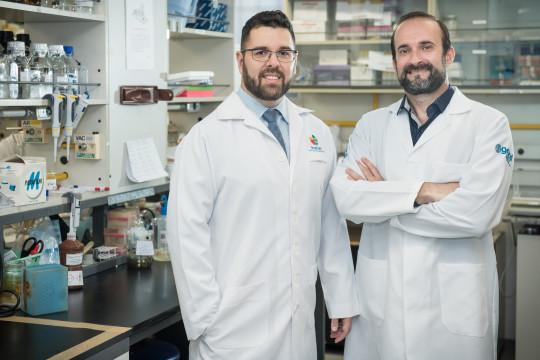Child abuse and inflammatory diseases
A study published in an international journal points to the increased likelihood of contracting diseases in the future

Researchers Rodrigo Grassi de Oliveira (L) and Moisés Bauer
Children who have been abused are more prone to developing inflammatory disorders in the future, such as cardiovascular, neurodegenerative and metabolic diseases. This is what the study carried out at PUCRS and published in the journal Neuropsychopharmacology, of the Nature Publishing Group has shown. The article was written jointly by former PhD students of the University Carine Hartmann do Prado and Ledo Daruy Filho; former postdoctoral fellow Andréa Wieck; the coordinator of the School of Medicine’s research group Cognitive Neuroscience of Development, Rodrigo Grassi de Oliveira and the coordinator of School of Sciences’ Laboratory of Immunology of Stress, Moisés Bauer.
The research was conducted with two groups of healthy teenagers, from public schools of Porto Alegre. A group consisting of 41 people reported being abused in their childhood whereas 33 others did not report any kind of abuse. All of them were subject to interviews and exams for physical, cognitive and biological conditions. These tests included an analysis of their levels of cortisol (hormone directly related to response to stress) with the use of their hair and the assessment of immune response in the blood.
For the group that suffered abuse, results showed an increase of 50% in the levels of cortisol, when compared to that of teenagers who did not. The lymphocytes in the individuals in the same group were 50% more resistant to dexametasone, a drug that mimics the action of cortisol. This means that cells are not allowing the substance, although it can be found in larger quantities. Blood tests that looked at the inflammatory markers pointed that they are up to six times more frequent in adolescents who have had a history of child abuse. “Even before the onset of a neuropsychiatric disorder, for instance, the behavior of cells indicate a proclivity to inflammation. So the inflammation may begin before theneuropsychiatric disorder”, says Bauer. The blood tests in the same group showed that the neurotrophin, a protein that ensures survival, development and normal operation of neurons, saw a reduction of 50%. “This is closely related to poor cognitive performance and memory”, states he.

In his view, the study proves that even the abuse an individual was subject to in the past leaves something like a scar in their adolescent bodies, a scar that has not healed. Up until now, people would believe that the inflammation would be caused by chronic diseases and the investigation has proven otherwise. “This is such a pioneering investigation because it was carried out with healthy teenagers. They were not ill, but their cells were somewhat inflamed”, adds Bauer.
Participants answered a questionnaire asking questions about the trauma they suffered in childhood, which is an international standard instrument. Results show that it is possible to differentiate the types of abuse a child suffers: physical neglect, emotional neglect, physical abuse, emotional abuse and sexual abuse. Grassi de Oliveira, one of the scholars involved in the investigation, claims that despite going through these situations at a younger age, the group did not show any behavioral or cognitive alterations during the tests: “The only thing these two groups differ are in their biology”. They were also subject to tests on memory, attention and psychiatric disorders.
Measuring cortisol in the hair

Each centimeter of hair is equivalent to a month of cortisol in the blood. The closer to the scalp, the more recent the indication of cortisol. The teenagers in the study had 3 cm of their hair measured, which corresponds to 90 days of cortisol in their bodies.



